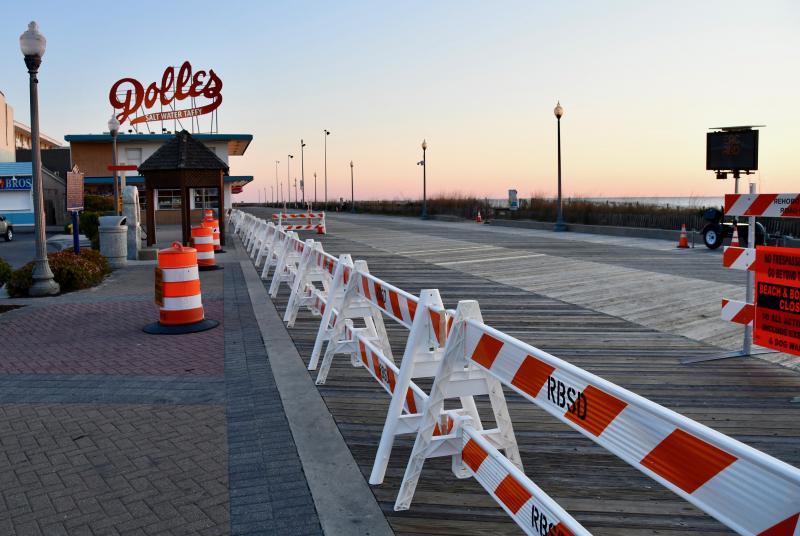Gov. John Carney took a big step to reopening Delaware’s beach communities May 14 when he lifted restrictions on using the beach and boardwalks for in-state residents or out-of-state residents who have quarantined for at least 14 days. Starting at 5 p.m. Friday, May 22, Delaware beaches will be open, although social distancing will be required on the beach, and masks will be required on the Boardwalk, Carney said in a press release.
“Summer at the beach and the pool is a huge part of life for so many Delawareans. As we ease our way into a new normal, we’re trying to find ways for Delawareans to enjoy the outdoors and the company of their families,” he said. “I want to be very clear to our friends who want to travel here from outside the state. While we hope one day soon to be able to welcome you to our beaches, that time has not yet come. We need to reopen Delaware in a controlled way that doesn’t put anyone at risk.”
Carney also lifted restrictions on community pools.
Delaware had been inching forward to a gradual reopening with hair salons already open for limited business, and farmers markets reopening Friday, May 15, along with beaches and boardwalks open for walking and exercise. Ice cream shops and trucks will be allowed to open May 15 for takeout or curbside pickup with six-foot social distancing.
When the Boardwalk and beach reopen, restaurants and vendors will still be restricted to take-out or delivery only, and arcades will be closed. Recommendations call for town to limit parking spaces and access points to the beach or to limit beach capacity, such as by issuing timed or day passes.
Towns are required to identify enforcement teams, and police continue traffic stops to check for out-of-state travelers.
“The Delaware State Police will continue to enforce the laws of the State of Delaware, to include those associated with the 14-day quarantine requirement for out-of-state travelers,” said Col. Nathaniel McQueen Jr., superintendent of the Delaware State Police. “Our emphasis and goal in enforcing the orders, specifically in regards to the travel restrictions, is to achieve voluntary compliance through education and awareness. The health and well-being of our troopers, as well as the community, will remain our top priority as we continue to serve and protect, during this unprecedented event.”
On May 12, Carney said he still expected Delaware to enter a Phase 1 reopening on June 1 – highly restrictive but which allows restaurants and gyms to reopen. Still, no crowds of more than 10 are allowed to gather, and school and youth activities remain shuttered. Even with community pools reopening May 22, the order specifically says no swim lessons or swim team practice is allowed.
A ban on short-term rentals to out-of-state visitors remains, something Carney said on May 12 will be addressed on a statewide basis.
Trends, programs needed before reopening
In Sussex County, the number of positive cases are increasing as more tests are conducted, but at the same time the number of hospitalizations is declining – a similar trend statewide.
“It's something we've been pleased with but curious to think about what it means,” Carney said about the Sussex statistics.
More than 65 percent of COVID-19 deaths have been in the senior population. The most vulnerable Delawareans are in the latter part of their lives, 65 or older with pre-existing health conditions, or living in nursing homes, Carney said.
Dr. Karyl Ratty, director of the Divison of Public Health, could not say what the normal death rate in long-term care facilities is compared to the number who have died from COVID-19. “I can't compare this number to our normal two-month period in a normal year,” she said. “The numbers and the devastation that this infection is having on residents of our long-term care facilities is unlike anything we have ever experienced.”
Using this season's flu season as comparison, she said, 11 people died with one who was living in a long-term care facility.
In order to reopen Delaware's economy, Carney said, there needs to be two weeks of downward COVID-19 trends, expanded testing, and a contact tracing program in place. At the onset of the pandemic in early March, contact tracers had pinpointed Delaware's first COVID-19 cases to a group of University of Delaware faculty and students who were infected by the virus while at an out-of-state gathering. As the number of cases rose, however, the state's contact tracers were overwhelmed and could not keep up with the community spread.
On May 12, Delaware announced a partnership with NORC at the University of Chicago to build Delaware's statewide contact tracing program. Carney said money from the federal CARES Act will pay for 200 contact tracers, but he did not know an exact dollar amount. “It's going to be a lot,” he said.
To bolster the contact tracing program, Carney said, 100 Delaware National Guard members will also work as contact tracers.
The contact tracing program builds on Delaware’s statewide plan to test up to 80,000 Delawareans monthly for COVID-19. Carney said he likes the NORC program because it is also working with the state of Maryland, which shares a long border with Delaware.
“We’ve been working with Maryland to coordinate our reopening efforts, and this partnership will build on that collaboration. Going forward, hiring a contact tracing workforce of Delawareans that reflects the diversity of our state will be a top priority,” Carney said.
Melissa Steele is a staff writer covering the state Legislature, government and police. Her newspaper career spans more than 30 years and includes working for the Delaware State News, Burlington County Times, The News Journal, Dover Post and Milford Beacon before coming to the Cape Gazette in 2012. Her work has received numerous awards, most notably a Pulitzer Prize-adjudicated investigative piece, and a runner-up for the MDDC James S. Keat Freedom of Information Award.




















































